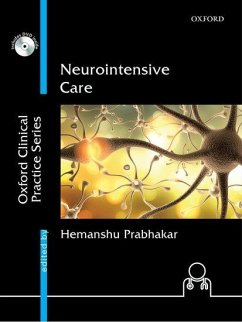Neurointensive Care
Herausgeber: Prabhakar, Hemanshu
Neurointensive Care
Herausgeber: Prabhakar, Hemanshu
- Gebundenes Buch
- Merkliste
- Auf die Merkliste
- Bewerten Bewerten
- Teilen
- Produkt teilen
- Produkterinnerung
- Produkterinnerung
This book is a state-of-art problem- and condition-based reference book on neurointensive management and care. It is comprehensive and covers the basic sciences as well as systemic care. It is well supported with multimedia video tutorials and has global authorship.
Andere Kunden interessierten sich auch für
![Medical Emergency Teams Medical Emergency Teams]() Michael A. DeVita / Kenneth Hillman / Rinaldo Bellomo (eds.)Medical Emergency Teams52,99 €
Michael A. DeVita / Kenneth Hillman / Rinaldo Bellomo (eds.)Medical Emergency Teams52,99 €![Emergency Medicine: Applications of Artificial Intelligence Emergency Medicine: Applications of Artificial Intelligence]() Emergency Medicine: Applications of Artificial Intelligence131,99 €
Emergency Medicine: Applications of Artificial Intelligence131,99 €![Annegamento Soccorso Tecnico E Sanitario Annegamento Soccorso Tecnico E Sanitario]() Elvia Battaglia / Alessio Baghin (eds.)Annegamento Soccorso Tecnico E Sanitario37,99 €
Elvia Battaglia / Alessio Baghin (eds.)Annegamento Soccorso Tecnico E Sanitario37,99 €![Critical Care Critical Care]() Taylor JohnstonCritical Care180,99 €
Taylor JohnstonCritical Care180,99 €![Rapid Emergency and Unscheduled Care Rapid Emergency and Unscheduled Care]() Oliver PhippsRapid Emergency and Unscheduled Care32,99 €
Oliver PhippsRapid Emergency and Unscheduled Care32,99 €![The Dark Side The Dark Side]() Andy ThompsonThe Dark Side15,99 €
Andy ThompsonThe Dark Side15,99 €![Disaster Management Disaster Management]() Mark HuntingtonDisaster Management247,99 €
Mark HuntingtonDisaster Management247,99 €-
-
-
This book is a state-of-art problem- and condition-based reference book on neurointensive management and care. It is comprehensive and covers the basic sciences as well as systemic care. It is well supported with multimedia video tutorials and has global authorship.
Produktdetails
- Produktdetails
- Verlag: Oxford University Press
- Seitenzahl: 864
- Erscheinungstermin: 4. September 2019
- Englisch
- Abmessung: 287mm x 226mm x 43mm
- Gewicht: 2132g
- ISBN-13: 9780199481439
- ISBN-10: 0199481431
- Artikelnr.: 53600316
- Herstellerkennzeichnung
- Libri GmbH
- Europaallee 1
- 36244 Bad Hersfeld
- gpsr@libri.de
- Verlag: Oxford University Press
- Seitenzahl: 864
- Erscheinungstermin: 4. September 2019
- Englisch
- Abmessung: 287mm x 226mm x 43mm
- Gewicht: 2132g
- ISBN-13: 9780199481439
- ISBN-10: 0199481431
- Artikelnr.: 53600316
- Herstellerkennzeichnung
- Libri GmbH
- Europaallee 1
- 36244 Bad Hersfeld
- gpsr@libri.de
Hemanshu Prabhakar is Professor in Neuroanaesthesiology and Critical Care at the All India Institute of Medical Sciences (AIIMS), New Delhi, India. He received his training in neuroanaesthesia and completed his PhD from the same institute. He is recipient of the AIIMS Excellence Award 2012 for notable contribution in academics. He has more than 250 publications in national and international journals to his credit. He is a reviewer for various national and international journals. He is also a review author for the Cochrane Collaboration and has special interest in evidence-based practice of neuroanaesthesia. He is a member of various national and international neuroanaesthesia societies and Secretary of the Indian Society of Neuroanaesthesiology and Critical Care. He is an invited faculty for various national and international conferences. He is on the Editorial Board of Indian Journal of Palliative Care and is the Executive Editor of Journal of Neuroanaesthesiology and Critical Care.
* Foreword by JL Vincent
* Preface
* Acknowledgements
*
* 1 Introduction and history of Neurointensive Care
* PART 1
* Basic principles of Neurointensive Care
* 2 Cerebral blood flow and dynamics
* 3 Cerebrospinal fluid dynamics
* 4 Intracranial pressure
* Postoperative Care
* 5 Postoperative care of neurosurgical patients
* Clinical monitoring
* 6 Hemodynamic monitoring
* 7 Respiratory monitoring
* 8 Intracranial pressure monitoring
* 9 Cerebral oxygenation
* 10 Cerebral metabolism
* 11 Electrophysiological monitoring
* 12 Neuroimaging
* 13 Use of Ultrasound
* Pharmacological Care
* 14 Sedation and analgesia
* 15 Osmotherapy agents
* 16 Vasoactive drugs
* 17 Anticonvulsants
* 18 Corticosteroids
* 19 Anticoagulants
* 20 Muscle relaxants
* 21 Antibiotics
* Fluids and dyselectrolytemia
* 22 Fluid management
* 23 Dyselectrolytemias: Water and electrolyte management
* Neurological Care
* 24 Altered mental status
* 25 Intracranial Hypertension
* 26 Cerebral oedema
* 27 Hydrocephalus
* 28 Vasospasm
* 29 Pneumocephalus
* 30 Central nervous system infections
* 31 Brain protective strategies
* Metabolic care
* 32 Glycaemic Control
* 33 Arterial blood gas analysis
* 34 Fever
* 35 Hypothermia
* Respiratory Care
* 36 Respiratory Care of neurologic patients
* Cardiovascular care
* 37 Cardiovascular care of neurologic patients
* Renal Care
* 38 Acute kidney injury
* 39 Renal replacement therapy
* Haematological Care
* 40 Anaemia
* 41 Coagulopathy
* 42 Blood transfusion
* 43 Deep Vein Thrombosis
* Endocrinal care
* 44 Endocrine care of neurologic patient
* Neuromuscular Care
* 45 Critical illness polyneuropathy and myopathy
* Gastrointestinal care
* 46 Gastrointestinal Bleeding
* 47 Gastrointestinal dysfunction and Ileus
* 48 Feeding - calculations, types and complications
* 49 Immunonutrition
* Psychological care
* 50 Neuropsychological Assessment in the Neurointensive Care Setting:
A Time Based Approach
* 51 Assessment and Management of Delirium in Medical Practice
* 52 Cognitive dysfunctions in psychiatric and neurological conditions
* Ethical Care
* 53 End of life care
* 54 Brain death
* 55 Organ donation
* Palliative Care
* 56 Palliative Care of neurologic patients
* Nursing Care and Physiotherapy
* 57 Nursing care
* 58 Physiotherapy
* Clinical procedures in neuro-ICU
* 59 Arterial and Venous access
* 60 Fibreoptic bronchoscopy and bronchial lavage
* 61 Intra-parenchymal ICP catheter insertion
* 62 External ventricular drainage systems
* 63 Lumbar drainage system
* 64 Subdural Evacuating Port System (SEPS) Placement for Chronic
Subdural Hematoma Evacuation
* 65 Percutaneous tracheostomy
* 66 Percutaneous Endoscopic Gastrostomy
* 67 Evaluation of Intracranial pressure using bedside ultrasonography:
Estimation of Optic Nerve Sheath Diameter (ONSD)
* 68 Echocardiography and Ultrasound in Neuro ICU
* 69 Cervical Spine Fixation with the Halo Brace
* PART 2
* Case management
* 70 Adult traumatic brain injury
* 71 Paediatric traumatic brain injury
* 72 Hypoxic ischemic encephalopathy
* 73 Status Epilepticus
* 74 Aneurysmal Subarachnoid Haemorrhage
* 75 Intracerebral hemorrhage
* 76 Acute ischaemic stroke - Hemispheric Middle cerebral artery stroke
* 77 Acute ischaemic stroke - Basilar Artery Stroke
* 78 Myasthenia gravis
* 79 Guillain Barré syndrome
* 80 Cerebral hyperperfusion syndrome
* 81 Cerebral venous thrombosis
* 82 Spinal cord injury
* 83 ICU acquired muscle weakness
* 84 Appendix
* Scales and Scores
* Preface
* Acknowledgements
*
* 1 Introduction and history of Neurointensive Care
* PART 1
* Basic principles of Neurointensive Care
* 2 Cerebral blood flow and dynamics
* 3 Cerebrospinal fluid dynamics
* 4 Intracranial pressure
* Postoperative Care
* 5 Postoperative care of neurosurgical patients
* Clinical monitoring
* 6 Hemodynamic monitoring
* 7 Respiratory monitoring
* 8 Intracranial pressure monitoring
* 9 Cerebral oxygenation
* 10 Cerebral metabolism
* 11 Electrophysiological monitoring
* 12 Neuroimaging
* 13 Use of Ultrasound
* Pharmacological Care
* 14 Sedation and analgesia
* 15 Osmotherapy agents
* 16 Vasoactive drugs
* 17 Anticonvulsants
* 18 Corticosteroids
* 19 Anticoagulants
* 20 Muscle relaxants
* 21 Antibiotics
* Fluids and dyselectrolytemia
* 22 Fluid management
* 23 Dyselectrolytemias: Water and electrolyte management
* Neurological Care
* 24 Altered mental status
* 25 Intracranial Hypertension
* 26 Cerebral oedema
* 27 Hydrocephalus
* 28 Vasospasm
* 29 Pneumocephalus
* 30 Central nervous system infections
* 31 Brain protective strategies
* Metabolic care
* 32 Glycaemic Control
* 33 Arterial blood gas analysis
* 34 Fever
* 35 Hypothermia
* Respiratory Care
* 36 Respiratory Care of neurologic patients
* Cardiovascular care
* 37 Cardiovascular care of neurologic patients
* Renal Care
* 38 Acute kidney injury
* 39 Renal replacement therapy
* Haematological Care
* 40 Anaemia
* 41 Coagulopathy
* 42 Blood transfusion
* 43 Deep Vein Thrombosis
* Endocrinal care
* 44 Endocrine care of neurologic patient
* Neuromuscular Care
* 45 Critical illness polyneuropathy and myopathy
* Gastrointestinal care
* 46 Gastrointestinal Bleeding
* 47 Gastrointestinal dysfunction and Ileus
* 48 Feeding - calculations, types and complications
* 49 Immunonutrition
* Psychological care
* 50 Neuropsychological Assessment in the Neurointensive Care Setting:
A Time Based Approach
* 51 Assessment and Management of Delirium in Medical Practice
* 52 Cognitive dysfunctions in psychiatric and neurological conditions
* Ethical Care
* 53 End of life care
* 54 Brain death
* 55 Organ donation
* Palliative Care
* 56 Palliative Care of neurologic patients
* Nursing Care and Physiotherapy
* 57 Nursing care
* 58 Physiotherapy
* Clinical procedures in neuro-ICU
* 59 Arterial and Venous access
* 60 Fibreoptic bronchoscopy and bronchial lavage
* 61 Intra-parenchymal ICP catheter insertion
* 62 External ventricular drainage systems
* 63 Lumbar drainage system
* 64 Subdural Evacuating Port System (SEPS) Placement for Chronic
Subdural Hematoma Evacuation
* 65 Percutaneous tracheostomy
* 66 Percutaneous Endoscopic Gastrostomy
* 67 Evaluation of Intracranial pressure using bedside ultrasonography:
Estimation of Optic Nerve Sheath Diameter (ONSD)
* 68 Echocardiography and Ultrasound in Neuro ICU
* 69 Cervical Spine Fixation with the Halo Brace
* PART 2
* Case management
* 70 Adult traumatic brain injury
* 71 Paediatric traumatic brain injury
* 72 Hypoxic ischemic encephalopathy
* 73 Status Epilepticus
* 74 Aneurysmal Subarachnoid Haemorrhage
* 75 Intracerebral hemorrhage
* 76 Acute ischaemic stroke - Hemispheric Middle cerebral artery stroke
* 77 Acute ischaemic stroke - Basilar Artery Stroke
* 78 Myasthenia gravis
* 79 Guillain Barré syndrome
* 80 Cerebral hyperperfusion syndrome
* 81 Cerebral venous thrombosis
* 82 Spinal cord injury
* 83 ICU acquired muscle weakness
* 84 Appendix
* Scales and Scores
* Foreword by JL Vincent
* Preface
* Acknowledgements
*
* 1 Introduction and history of Neurointensive Care
* PART 1
* Basic principles of Neurointensive Care
* 2 Cerebral blood flow and dynamics
* 3 Cerebrospinal fluid dynamics
* 4 Intracranial pressure
* Postoperative Care
* 5 Postoperative care of neurosurgical patients
* Clinical monitoring
* 6 Hemodynamic monitoring
* 7 Respiratory monitoring
* 8 Intracranial pressure monitoring
* 9 Cerebral oxygenation
* 10 Cerebral metabolism
* 11 Electrophysiological monitoring
* 12 Neuroimaging
* 13 Use of Ultrasound
* Pharmacological Care
* 14 Sedation and analgesia
* 15 Osmotherapy agents
* 16 Vasoactive drugs
* 17 Anticonvulsants
* 18 Corticosteroids
* 19 Anticoagulants
* 20 Muscle relaxants
* 21 Antibiotics
* Fluids and dyselectrolytemia
* 22 Fluid management
* 23 Dyselectrolytemias: Water and electrolyte management
* Neurological Care
* 24 Altered mental status
* 25 Intracranial Hypertension
* 26 Cerebral oedema
* 27 Hydrocephalus
* 28 Vasospasm
* 29 Pneumocephalus
* 30 Central nervous system infections
* 31 Brain protective strategies
* Metabolic care
* 32 Glycaemic Control
* 33 Arterial blood gas analysis
* 34 Fever
* 35 Hypothermia
* Respiratory Care
* 36 Respiratory Care of neurologic patients
* Cardiovascular care
* 37 Cardiovascular care of neurologic patients
* Renal Care
* 38 Acute kidney injury
* 39 Renal replacement therapy
* Haematological Care
* 40 Anaemia
* 41 Coagulopathy
* 42 Blood transfusion
* 43 Deep Vein Thrombosis
* Endocrinal care
* 44 Endocrine care of neurologic patient
* Neuromuscular Care
* 45 Critical illness polyneuropathy and myopathy
* Gastrointestinal care
* 46 Gastrointestinal Bleeding
* 47 Gastrointestinal dysfunction and Ileus
* 48 Feeding - calculations, types and complications
* 49 Immunonutrition
* Psychological care
* 50 Neuropsychological Assessment in the Neurointensive Care Setting:
A Time Based Approach
* 51 Assessment and Management of Delirium in Medical Practice
* 52 Cognitive dysfunctions in psychiatric and neurological conditions
* Ethical Care
* 53 End of life care
* 54 Brain death
* 55 Organ donation
* Palliative Care
* 56 Palliative Care of neurologic patients
* Nursing Care and Physiotherapy
* 57 Nursing care
* 58 Physiotherapy
* Clinical procedures in neuro-ICU
* 59 Arterial and Venous access
* 60 Fibreoptic bronchoscopy and bronchial lavage
* 61 Intra-parenchymal ICP catheter insertion
* 62 External ventricular drainage systems
* 63 Lumbar drainage system
* 64 Subdural Evacuating Port System (SEPS) Placement for Chronic
Subdural Hematoma Evacuation
* 65 Percutaneous tracheostomy
* 66 Percutaneous Endoscopic Gastrostomy
* 67 Evaluation of Intracranial pressure using bedside ultrasonography:
Estimation of Optic Nerve Sheath Diameter (ONSD)
* 68 Echocardiography and Ultrasound in Neuro ICU
* 69 Cervical Spine Fixation with the Halo Brace
* PART 2
* Case management
* 70 Adult traumatic brain injury
* 71 Paediatric traumatic brain injury
* 72 Hypoxic ischemic encephalopathy
* 73 Status Epilepticus
* 74 Aneurysmal Subarachnoid Haemorrhage
* 75 Intracerebral hemorrhage
* 76 Acute ischaemic stroke - Hemispheric Middle cerebral artery stroke
* 77 Acute ischaemic stroke - Basilar Artery Stroke
* 78 Myasthenia gravis
* 79 Guillain Barré syndrome
* 80 Cerebral hyperperfusion syndrome
* 81 Cerebral venous thrombosis
* 82 Spinal cord injury
* 83 ICU acquired muscle weakness
* 84 Appendix
* Scales and Scores
* Preface
* Acknowledgements
*
* 1 Introduction and history of Neurointensive Care
* PART 1
* Basic principles of Neurointensive Care
* 2 Cerebral blood flow and dynamics
* 3 Cerebrospinal fluid dynamics
* 4 Intracranial pressure
* Postoperative Care
* 5 Postoperative care of neurosurgical patients
* Clinical monitoring
* 6 Hemodynamic monitoring
* 7 Respiratory monitoring
* 8 Intracranial pressure monitoring
* 9 Cerebral oxygenation
* 10 Cerebral metabolism
* 11 Electrophysiological monitoring
* 12 Neuroimaging
* 13 Use of Ultrasound
* Pharmacological Care
* 14 Sedation and analgesia
* 15 Osmotherapy agents
* 16 Vasoactive drugs
* 17 Anticonvulsants
* 18 Corticosteroids
* 19 Anticoagulants
* 20 Muscle relaxants
* 21 Antibiotics
* Fluids and dyselectrolytemia
* 22 Fluid management
* 23 Dyselectrolytemias: Water and electrolyte management
* Neurological Care
* 24 Altered mental status
* 25 Intracranial Hypertension
* 26 Cerebral oedema
* 27 Hydrocephalus
* 28 Vasospasm
* 29 Pneumocephalus
* 30 Central nervous system infections
* 31 Brain protective strategies
* Metabolic care
* 32 Glycaemic Control
* 33 Arterial blood gas analysis
* 34 Fever
* 35 Hypothermia
* Respiratory Care
* 36 Respiratory Care of neurologic patients
* Cardiovascular care
* 37 Cardiovascular care of neurologic patients
* Renal Care
* 38 Acute kidney injury
* 39 Renal replacement therapy
* Haematological Care
* 40 Anaemia
* 41 Coagulopathy
* 42 Blood transfusion
* 43 Deep Vein Thrombosis
* Endocrinal care
* 44 Endocrine care of neurologic patient
* Neuromuscular Care
* 45 Critical illness polyneuropathy and myopathy
* Gastrointestinal care
* 46 Gastrointestinal Bleeding
* 47 Gastrointestinal dysfunction and Ileus
* 48 Feeding - calculations, types and complications
* 49 Immunonutrition
* Psychological care
* 50 Neuropsychological Assessment in the Neurointensive Care Setting:
A Time Based Approach
* 51 Assessment and Management of Delirium in Medical Practice
* 52 Cognitive dysfunctions in psychiatric and neurological conditions
* Ethical Care
* 53 End of life care
* 54 Brain death
* 55 Organ donation
* Palliative Care
* 56 Palliative Care of neurologic patients
* Nursing Care and Physiotherapy
* 57 Nursing care
* 58 Physiotherapy
* Clinical procedures in neuro-ICU
* 59 Arterial and Venous access
* 60 Fibreoptic bronchoscopy and bronchial lavage
* 61 Intra-parenchymal ICP catheter insertion
* 62 External ventricular drainage systems
* 63 Lumbar drainage system
* 64 Subdural Evacuating Port System (SEPS) Placement for Chronic
Subdural Hematoma Evacuation
* 65 Percutaneous tracheostomy
* 66 Percutaneous Endoscopic Gastrostomy
* 67 Evaluation of Intracranial pressure using bedside ultrasonography:
Estimation of Optic Nerve Sheath Diameter (ONSD)
* 68 Echocardiography and Ultrasound in Neuro ICU
* 69 Cervical Spine Fixation with the Halo Brace
* PART 2
* Case management
* 70 Adult traumatic brain injury
* 71 Paediatric traumatic brain injury
* 72 Hypoxic ischemic encephalopathy
* 73 Status Epilepticus
* 74 Aneurysmal Subarachnoid Haemorrhage
* 75 Intracerebral hemorrhage
* 76 Acute ischaemic stroke - Hemispheric Middle cerebral artery stroke
* 77 Acute ischaemic stroke - Basilar Artery Stroke
* 78 Myasthenia gravis
* 79 Guillain Barré syndrome
* 80 Cerebral hyperperfusion syndrome
* 81 Cerebral venous thrombosis
* 82 Spinal cord injury
* 83 ICU acquired muscle weakness
* 84 Appendix
* Scales and Scores








